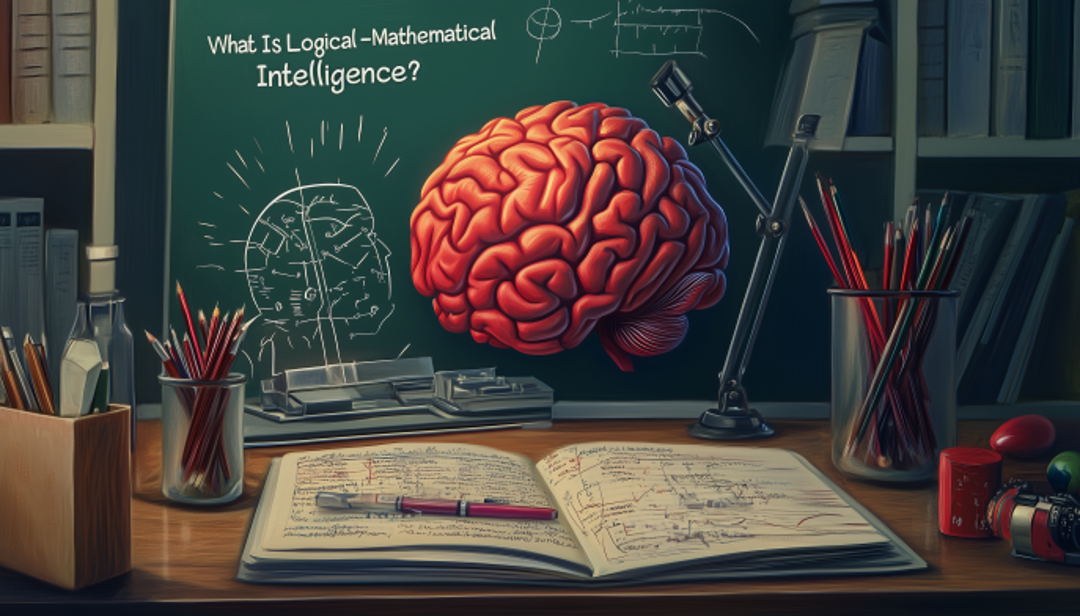Understanding Logical-Mathematical Intelligence: Beyond 'Math Smart' – Developing Skills That Matter
Logical-mathematical intelligence isn’t just for mathematicians, computer geeks, or scientists. Whether you thrive with numbers or struggle with them, this intelligence plays a role in everyday problem-solving, critical thinking, and pattern recognition. Discover how a logical-mathematical learning style shapes success in careers, hobbies, and daily life—and how you can develop it further.


Back
10 mins read
Quick. What’s 234 × 434?
You’re probably reaching for your calculator. Don’t worry—you’re not alone. By the way, the answer is 101,556.
But here’s the thing—some people can solve problems like this faster than you can type the digits.
A recent viral video on X (formerly Twitter) showed a young boy's stunning audiences by solving complex math equations in seconds during a televised quiz. Devan's speed and accuracy left viewers in awe, sparking conversations about the nature of intelligence. You’ve probably met people like that—those who seem to have a supernatural talent for numbers and logic. They leave you wondering, how is that even possible?
Are they geniuses? Maybe.
But genius isn’t just about numbers and equations. What they possess is logical-mathematical intelligence—often described as being "math smart" or "number smart." However, logical-mathematical intelligence goes beyond just being good at math. It reflects the ability to reason, recognize patterns, and solve problems in a structured way.
According to Howard Gardner’s Theory of Multiple Intelligences, logical-mathematical skills are innate for some, just like artistic or musical abilities are for others. Gardner suggests that our brains are wired differently, and for many, math just clicks.
But even if you weren’t born “math smart,” this type of intelligence can still be developed and strengthened over time.
In this article, we’ll explore what logical-mathematical intelligence is, how it manifests, and whether it can be improved. We’ll also dive into the broader spectrum of human intelligence and how different strengths shape the way we learn and think.
What Is Logical-Mathematical Intelligence? Hint: It's More than Just Math Smarts!

Logical-mathematical intelligence is the ability to analyze problems, recognize patterns, and apply reasoning to find solutions. It encompasses mathematical thinking, scientific inquiry, and the capacity to approach problems systematically. People with strong logical-mathematical intelligence excel at working with numbers, performing calculations, and developing structured solutions to complex questions.
This form of intelligence was first introduced by Howard Gardner in his Theory of Multiple Intelligences. Gardner proposed that intelligence is not a single, fixed attribute measured solely by IQ but rather a collection of distinct intelligences, each representing different ways people process information. Logical-mathematical intelligence was identified as one of the core types, essential for critical thinking, scientific reasoning, and numerical problem-solving.
Interestingly, this intelligence aligns closely with the analytical intelligence component of Robert Sternberg's Triarchic Theory of Intelligence. Analytical intelligence emphasizes problem-solving, critical thinking, and the ability to evaluate and break down information systematically, mirroring the strengths of logical-mathematical learners.
This form of intelligence goes beyond basic math skills. It reflects the capacity to think critically, draw connections between concepts, and create step-by-step strategies for solving problems. Analytical intelligence, problem-solving skills, and deductive reasoning are all hallmarks of logical-mathematical intelligence, making it essential in fields that require structured thought and precision.
If you are a logical mathematical learner you are likely to demonstrate:
- A natural ability to identify patterns and predict outcomes.
- Comfort with abstract concepts, formulas, and algorithms.
- Strong reasoning skills, allowing them to break down problems logically.
How It Shows Up in Real Life
Logical-mathematical intelligence plays a crucial role in both academic and professional settings. People with this strength gravitate toward fields like:
- Mathematics and Physics – They enjoy solving equations, interpreting data, and exploring scientific phenomena.
- Computer Science and Programming – Writing code, debugging software, and developing algorithms require structured, logical thinking.
- Engineering – Designing solutions and understanding complex systems relies heavily on problem-solving intelligence.
- Data Analysis – Recognizing trends, interpreting datasets, and applying statistical models highlight numerical reasoning skills.
In the workplace, individuals with strong logical-mathematical intelligence prefer roles with clear rules, structured environments, and measurable outcomes. Careers in finance, architecture, information technology, and research often appeal to their strengths.
Similar to INTJ and ISTJ personality types, they thrive on structure, strategic planning, and logical problem-solving, excelling in fields where precision and order are essential. Ambiguous or unorganized tasks can feel draining or frustrating, as they prefer efficiency, clearly defined processes, and tangible results.

Is Logical-Mathematical Intelligence the Same as IQ?
Although logical-mathematical intelligence aligns closely with skills measured in traditional IQ tests, it represents just one aspect of human intelligence. Standard IQ tests often emphasize numerical reasoning and problem-solving, areas where those with high logical-mathematical intelligence naturally excel. However, intelligence extends far beyond IQ, encompassing creativity, emotional intelligence, and interpersonal skills.
While some individuals are naturally inclined toward logical thinking, this intelligence can be strengthened through practice and exposure to activities that promote critical thinking and reasoning.
Key Attributes and Logical-Mathematical Intelligence Examples

Logical-mathematical intelligence reveals itself through distinct cognitive strengths and problem-solving abilities. In academic, professional, and recreational settings, this intelligence helps individuals excel in areas that require structured thinking, numerical reasoning, and analytical problem-solving.
1. Analytical Thinking and Pattern Recognition
People with logical-mathematical intelligence excel at recognizing abstract concepts and identifying numerical patterns, making them highly effective at interpreting data and analyzing trends. This ability enhances their performance in statistical and analytical programs, where precision and attention to detail are crucial. Success often comes in fields such as mathematics, physics, and engineering, where the capacity to understand abstract concepts drives innovation and problem-solving.
2. Sequential and Logical Thinking
A hallmark of logical intelligence is the ability to apply structured reasoning to solve complex problems step by step. This trait enables individuals to thrive in analytical programs, where logical sequences are essential for troubleshooting and system development. Careers in computer programming, engineering, and data science frequently draw on this ability, as does participation in coding challenges, algorithm design, and strategic games that require long-term planning and predictive thinking.
3. Mathematical Aptitude and Numerical Reasoning
Those with strong logical-mathematical intelligence often demonstrate exceptional proficiency in mathematical operations and are drawn to tasks involving quantitative analysis and modeling. Their talent for interpreting data and applying numerical reasoning allows them to succeed in data analysis, financial modeling, and machine learning competitions. These individuals frequently engage in hackathons and mathematical Olympiads, applying their skills to real-world problems that require statistical precision.
4. Affinity for Logic-Based Activities and Strategy Games
Logical-mathematical thinkers naturally gravitate toward activities that challenge their ability to strategize, recognize patterns, and predict outcomes. This often leads to success in strategic games like chess, as well as activities such as Rubik’s cubes, escape rooms, and brainteasers. Many also thrive in scientific research environments, where they apply logical reasoning to design experiments, test hypotheses, and analyze results.
Recognizing these attributes is the first step, but how can you actively develop and enhance logical-mathematical intelligence? Let’s explore practical ways to strengthen these skills and apply them to everyday life.
How to Develop Logical-Mathematical Intelligence

Logical-mathematical intelligence can be cultivated through structured exercises and daily habits. Below are two complementary approaches – formal learning strategies and everyday math challenges – that work together to strengthen analytical thinking and problem-solving abilities.
Formal Strategies to Improve Logical-Mathematical Learning
These strategies focus on enhancing problem-solving, pattern recognition, and reasoning through more structured and intentional activities.
Engage in problem-solving exercises and math-based games.
Regularly challenge your brain with logic puzzles, memory or logic games, Sudoku, escape rooms, and strategy board games. Activities like chess, KenKen, and brainteasers enhance critical thinking by reinforcing logical pathways.
Additionally, playing math puzzle apps, mobile games like 2048, and other interactive problem-solving exercises strengthens analytical abilities while making learning enjoyable. These activities not only develop logical intelligence but also improve pattern recognition and strategic thinking over time.
Deepen mathematical knowledge in real life.
Study math subjects such as algebra, geometry, and calculus, but also seek out opportunities to apply these skills in real-world contexts. This combination sharpens pattern recognition and abstract thinking.
Practice analytical thinking through data and trends.
Tackle coding challenges, analyze datasets, or manually manage personal budgets. These tasks encourage deeper engagement with data interpretation and strengthen pattern recognition.
Participate in structured discussions and debates.
Join philosophy clubs, debate teams, or problem-solving groups. Engaging in structured discussions enhances your ability to formulate logical arguments, reason through opposing views, and think critically under pressure.
Practical Tips to Improve Logical-Mathematical Learning Styles
Incorporating math into daily activities is a simple yet powerful way to enhance logical-mathematical intelligence. These small tasks make practicing math feel natural and rewarding.
Solve Mental Math and Handle Bills Without a Calculator
Before reaching for your phone, challenge yourself to solve simple math problems mentally. Whether it’s calculating restaurant bills, grocery totals, or gas mileage, try estimating amounts and rounding numbers for quick calculations.
The next time you dine out, manually divide the bill among friends or calculate the tip in your head. This not only sharpens your multiplication, division, and percentage skills but also reinforces everyday problem-solving and strengthens your overall numerical reasoning.
Incorporate math into hobbies and hands-on projects.
Engage in hobbies like woodworking, knitting, gardening, or home improvement projects that require measuring, estimating, and applying mathematical concepts. Designing blueprints, calculating material needs, or planning garden layouts involves problem-solving exercises and enhances logical thinking.
Projects like knitting or quilting develop pattern recognition and sequencing, while budgeting for supplies encourages real-world application of addition, subtraction, and percentages. These hobbies provide a fun, hands-on way to strengthen logical-mathematical intelligence through practical tasks.
Mentally calculate discounts and use sales flyers for real-world math.
When shopping, challenge yourself to calculate percent discounts and subtract coupon amounts without using a calculator. Mentally figure out savings and compare deals to sharpen subtraction, division, and percentage skills.
Use weekly sales flyers to practice real-world math by computing sale prices—if an item is marked 30% off, estimate the final price or compare store discounts to find the best deal. This hands-on approach reinforces practical math skills and strengthens logical thinking in everyday situations.
Track expenses and estimate totals to strengthen math skills.
Take charge of your finances and shopping by engaging in manual calculations. Instead of relying on apps, track expenses, savings, and budgets by hand or in spreadsheets. This keeps you actively involved in addition, subtraction, and pattern analysis.
While grocery shopping, keep a running tally of items in your cart, rounding prices and estimating tax to predict the final total at checkout. Compare your estimate to the actual amount to sharpen your accuracy and track your progress over time.
Plan travel routes and vacations with math.
Use math to take control of your travel planning. When mapping out trips, manually calculate mileage, travel time, and gas usage instead of relying solely on GPS. This engages your brain with ratios, rates, and estimation.
Take it a step further by planning full vacations—estimate hotel stays, food budgets, and activity costs to create a comprehensive travel budget. Predict expenses for each leg of the trip and compare your estimates to actual costs. This practice sharpens your problem-solving and budgeting skills while reinforcing practical math in a fun, goal-oriented way.
Famous Figures with High Logical-Mathematical Intelligence

Throughout history, individuals with exceptional logical-mathematical intelligence have transformed the world through groundbreaking discoveries and innovations. Some of the most iconic examples include:
- Albert Einstein – His theory of relativity and contributions to quantum mechanics reshaped physics and our understanding of the universe.
- Leonardo da Vinci – A polymath who blended scientific experiments, engineering, and artistic brilliance, showcasing his logical-mathematical mindset across disciplines.
- Nikola Tesla – Tesla’s groundbreaking work in electricity, magnetism, and wireless energy transmission demonstrated exceptional analytical thinking and scientific innovation, shaping modern electrical engineering.
- Ada Lovelace – Often regarded as the first computer programmer, Lovelace developed algorithms for Charles Babbage’s early mechanical computer.
- Alan Turing – Turing’s work on breaking the Enigma code during World War II not only helped the Allies but laid the foundation for modern computer science and artificial intelligence.
- J. Robert Oppenheimer – A leading figure in the Manhattan Project, Oppenheimer applied advanced physics and mathematical reasoning to develop the atomic bomb, shaping modern theoretical science.
While these historical figures paved the way, modern innovators and thinkers continue to exemplify logical-mathematical intelligence in diverse fields today.
Here are a few examples of notable contemporary figures who display exceptional mathematical reasoning and problem-solving abilities:
Magnus Carlsen – Master of Strategy and Problem Solving
As one of the world’s leading chess players, Magnus Carlsen demonstrates extraordinary pattern recognition, strategic thinking, and problem-solving skills. His ability to predict moves and counter complex strategies is a prime example of logical-mathematical intelligence in action. Chess, at the highest level, requires players to engage in abstract reasoning and long-term planning, areas where Carlsen excels.
Elon Musk – Innovator and Engineer
Elon Musk’s ventures, including Tesla, SpaceX, and Neuralink, reflect his ability to solve large-scale engineering problems and think analytically about complex systems. Musk’s talent for designing efficient technologies, optimizing resources, and envisioning innovative solutions demonstrates the intersection of logical-mathematical intelligence and applied science. His problem-solving extends across industries, influencing the future of transportation, space travel, and artificial intelligence.
Katherine Johnson – Spaceflight Mathematician
Katherine Johnson’s precise mathematical calculations were critical to NASA’s early space missions, including John Glenn’s orbit around Earth. Her ability to conduct scientific research, analyze data, and verify complex flight trajectories highlights the real-world impact of logical-mathematical intelligence. Johnson’s work not only advanced space exploration but also paved the way for women and people of color in STEM fields.
Intersection of Logical-Mathematical Intelligence with Other Intelligences

Gardner’s theory of multiple intelligences highlights the diverse ways humans think and learn. Logical-mathematical intelligence often overlaps with other forms, enhancing and reinforcing skills across different areas. Let’s explore how this interplay works:
How Does Logical-Mathematical Intelligence Support Linguistic Intelligence?
Logical-mathematical learners with strong linguistic intelligence can express complex ideas clearly and persuasively. A journalist may use logical reasoning to structure arguments, while a mathematician relies on language to explain abstract theories in an accessible way.
Can Logical-Mathematical Intelligence Enhance Musical Intelligence?
Pattern recognition is essential in both logical-mathematical and musical intelligence. Composers apply mathematical principles to create melodies, while scientists may find musical symmetry inspiring and useful in their own structured problem-solving.
How Does Logical-Mathematical Intelligence Relate to Bodily-Kinesthetic Intelligence?
A surgeon or engineer blends physical precision with logical calculations. Logical-mathematical intelligence plays a role in refining fine motor skills, helping a logical mathematical child excel in sports, robotics, or surgery by integrating strategic thinking with physical execution.
Why Is Logical-Mathematical Intelligence Important for Visual-Spatial Intelligence?
Logical-mathematical and visual-spatial intelligence both rely on the ability to recognize and manipulate abstract patterns. Architects, for example, visualize designs while applying logical principles to ensure structural soundness. Engineers frequently merge these skills when developing blueprints or product designs.
How Can Logical-Mathematical Intelligence Strengthen Interpersonal Intelligence?
Team collaboration benefits when logical-mathematical intelligence is paired with interpersonal skills. A project manager may organize tasks through logical planning while using interpersonal intelligence to motivate and engage colleagues. A logical mathematical child may excel in group projects by applying analytical skills while interacting and problem-solving with peers.
What Role Does Logical-Mathematical Intelligence Play in Intrapersonal Intelligence?
Logical-mathematical intelligence complements introspection and self-analysis. Logical thinkers often apply structured reasoning to evaluate personal strengths, set goals, and reflect on their progress. Philosophers and analysts use this combination to assess decisions and refine their life paths.
How Does Logical-Mathematical Intelligence Contribute to Naturalistic Intelligence?
Ecologists and conservationists apply statistical models and data analysis to study ecosystems. This blend of naturalistic and logical-mathematical intelligence enhances their ability to classify, observe, and make data-driven conclusions about environmental patterns and changes.
Can Logical-Mathematical Intelligence Shape Existential Intelligence?
Logical-mathematical intelligence helps frame philosophical and scientific inquiries into life’s biggest questions. Physicists and existential thinkers apply structured analysis and logical reasoning to explore the nature of existence, combining scientific rigor with deep existential reflection.
Understanding how logical-mathematical intelligence connects to other forms creates opportunities for more holistic growth. Educators and parents can foster this interplay by encouraging a logical mathematical child to explore diverse activities, strengthening both intellectual and social development.
Is Logical-Mathematical Intelligence Your Thing?

Logical-mathematical intelligence shines through critical thinking, mathematical skills, and scientific inquiry, driving much of the technological and scientific progress that shapes our world.
If you’re looking to strengthen this form of intelligence, adopting a logical-mathematical learning style can help. Engaging in logic puzzles, math challenges, and intellectual debates is like exercising a muscle—over time, your analytical abilities will grow sharper and more refined.
But remember, as Gardner’s theory highlights, intelligence is multifaceted. Logical-mathematical intelligence is just one of nine unique ways humans express their strengths.
If numbers and problem-solving aren’t your strong suits, don’t worry—there are many paths to brilliance. Exploring the other forms of intelligence can help you discover your strengths, offering equally valuable contributions to the world around you.
Where do your strengths lie? And how can enhancing your logical-mathematical intelligence complement and expand them?


Return to Blog





